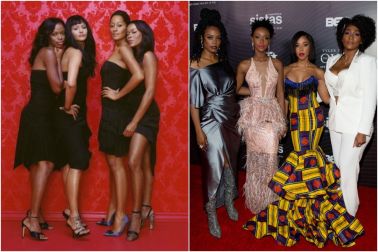
Source: Darien Davis/CBS Photo Archive/Marcus Ingram / Getty
Sistas, a new BET show produced by Tyler Perry comes at a time where Black women have the option to tell their stories from their lens. Sistas shows a group of beautiful, educated and fierce Black women much like the women in Mara Brock Akil’s Girlfriends. The sitcom, which first aired in 2000, helped create the ranks for other narratives about Black womanhood to exist.
The show ran for eight years and during that time showed us the nuances of Black sisterhood. They bickered, fought, cried and asked one another hard and uncomfortable questions. With the emergence of Sistas, it’s nice to know we not only get to reap the benefits of shows like Girlfriends, but we also don’t have to lean on it anymore.
https://twitter.com/SistasonBet/status/1179879044428390402?s=20
In Sistas, we have four women in their thirties who are trying to figure out love, life and doing what’s best for them. KJ Smith plays Andrea Barnett, a divorce lawyer who has the most ironic love life. Andrea is sleeping with a married man and hides the relationship from all of her friends except Karen Mott, played by Ebony Obsidian. Karen is also dealing with her own troubles. She is trying her best to leave her cheating boyfriend, who even managed to give her a sexually transmitted disease. She is headstrong, or at least tries to be, and next to Danni King who is played by Mignon Von, Karen is the most outspoken of the group. Danni has no filter and rides for her girls at all cost, fulfilling the role of comic relief. Sabrina, who is played by Novi Brown, is the sweetheart of the group. She works as a bank teller and in a lot of ways holds the group together in the same way Tracee Ellis Ross’ character, Joan, did in Girlfriends.
Sistas opens with Andi having morning sex and everything seems great. It’s her birthday and her man has made the effort to be the first person to see her. But in the first ten minutes we realize he is married and that she is the other woman. This begged the question for me, why is the root of our drama frequently rooted in infidelity. I can’t help but think about shows like Scandal or Being Mary Jane which initially thrived on that narrative, which in some ways reinforces the Jezebel trope. So is Sistas really doing “sistas” justice on television, is something black women will have to determine for themselves.
Other recent Black women led shows like Issa Rae’s Insecure and Spike Lee’s She’s Gotta Have It, break down Black girl success, struggle, and day-to-day situations with women and men. Part of what makes Sistas different is its ability to be funny but also hit us with drama. This is not to say Girlfriends didn’t do the same, but the intense plights, like colorism, talking about the n-word were usually rescued by the root of the show– sitcom. Sistas drops the laugh track, there’s more pressure to get it right. There is no comedic relief to hide behind.
In addition, shows like Robin Thede’s Black Lady Sketch Show on HBO also exemplifies the range found in Black womanhood. In an interview between Thede and Quinta Brunson, two of the show regulars, they discuss the quirkiness and diversity in their comedic plots and the program’s uniqueness. It’s not a Dave Chappelle skit or Saturday Night Live segment. It differentiated from the stereotypical roles depicting Black women have starred in the past, from prostitutes and evil black mothers to mistresses. Black Lady Sketch Show is original, to say the least, and is a comedy that dives headfirst into the minds of Black women without wondering if they’ll be understood by non-Black viewers. Girlfriends did the same and Sistas carries the torch.
Shows like Sistas intends to extend the spectrum, leaving us clapping and nodding our heads in agreement. When Karen is trying her best to kick her boyfriend out of her house, we see her breakdown as her boyfriend drops to his knees begging for her forgiveness. In that moment we don’t blame her for comforting him, but we also peep the emotional manipulation. There is comfort in identifying with these women, even when it’s negative. Our range of representation is still growing and still difficult to master for the big screen, even for us.
Our stories of pain have helped set the stage for the other stories we want to tell. Negative Black tropes haven’t been eliminated but we’ve steered away from them. In comparison to slave narrative or stories that focus directly on our struggle, shows like Sistas are dedicated to the humanity in our narratives. That’s also what Girlfriends did. In a society where Black women are dehumanized, these shows demand viewership from a Black feminine gaze.
Shows like Sistas is arguably proof that we’ve managed to break barriers. There were times when Black people, specifically Black women, weren’t able to explore our creativity with reckless abandon. But now we can and add anything we desire to the full range of our representation. Sistas exhibits the confidence we have in our cinema and how fearless and vulnerable we are in our art. But at the same time we aren’t afraid to brag on the unique and special experience it is to be a Black girl.
As Black women, we’ve shown time and time again our ability to not only create a seat at the table in Hollywood, but to build the chair.









